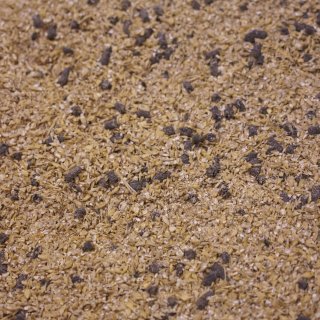Understanding how chalk soils affect sheep nutrition and implementing effective mineral management strategies are essential steps in preventing deficiencies and promoting the well-being of grazing sheep.
Kathryn Thompson :: Tuesday 9th April 2024 :: Latest Blog Posts
Mineral Management: How chalk soils can impact your sheep nutrition

When it comes to optimising sheep nutrition, the significance of mineral management cannot be overstated. The landscape beneath our livestock, particularly the soil type on which they graze, plays a pivotal role in determining the nutritional value of their feed. This connection between terrain and health is a crucial aspect of farm management, yet it often goes unnoticed.
Among various soil types, chalk soils present a unique challenge for grazing sheep, influencing the mineral content of the forage available to them. These soils can lead to mineral deficiencies that, if not addressed, may impact the overall health and productivity of the flock.
Understanding how chalk soils affect sheep nutrition and implementing effective mineral management strategies are essential steps in preventing deficiencies and promoting the well-being of grazing sheep. This blog delves into the intricacies of mineral management in sheep grazing on chalk soils, shedding light on strategies to overcome potential nutritional hurdles.
Mineral Deficiencies in Livestock Grazing on Different Soils
The relationship between soil type and mineral availability is a critical yet often overlooked aspect of livestock nutrition. Different soils have varying capacities to provide essential minerals to the plants that grow in them, directly affecting the mineral content of the forage consumed by livestock. Chalk soils, characterised by their high pH levels and lower organic matter content, can particularly influence the mineral uptake in plants, often leading to deficiencies in key nutrients required by grazing animals.
Breeding animals and young livestock, with their heightened nutritional needs, are especially susceptible to these deficiencies. The additional demands of growth, development and reproduction can exacerbate the effects of mineral shortages, impacting overall health and productivity. For instance, sheep grazing on chalk soils might encounter challenges in meeting their requirements for minerals like copper and selenium, vital for immune function and fertility.
Addressing these disparities through careful mineral management is paramount to maintaining a healthy flock. By identifying the specific mineral deficiencies prevalent in different soil types, farmers can implement targeted supplementation strategies. This ensures that all animals, particularly those in vulnerable groups such as breeding ewes and lambs, receive a balanced diet that supports optimal health and performance.
Chalk Soils and Sheep Nutrition
Chalk soils, prevalent in regions such as Hampshire and the South Downs in the UK, present a unique set of challenges and considerations for sheep management. But what exactly is chalk, and how does it influence the soil and, subsequently, sheep nutrition?
Chalk is a soft, white, porous sedimentary rock; a form of limestone predominantly composed of the mineral calcite. Chalk-based soils, derived from this rock, are typically shallow, free-draining and have a high pH level, making them alkaline. Visually, these soils can range from deep, rich earth to paler, stonier ground, with their distinctiveness lying in their texture and colour due to the high calcite content.
In terms of mineral content, chalk soils are naturally high in calcium due to their limestone origins. However, this abundance in calcium can sometimes inhibit the uptake of other essential minerals, leading to deficiencies. Key minerals such as phosphorus, magnesium and trace elements like selenium and iodine, crucial for sheep's health and productivity, are often found to be lacking in these soils.
The unique composition of chalk soils requires a tailored approach to sheep nutrition and mineral management. Recognizing what minerals are abundant and which are deficient is the first step in ensuring that grazing sheep on these soils receive a well-rounded diet, supporting their health, growth and reproductive success.
Calcium and Magnesium Balance in Sheep Grazing on Chalk Soils
In the delicate balance of sheep nutrition, the ratio of calcium to magnesium emerges as a critical factor, especially for those grazing on chalk soils. Calcium, essential for bone development and muscle function, becomes even more crucial during periods of rapid growth and lactation. Magnesium, on the other hand, is vital for enzyme activation, energy metabolism and maintaining normal nerve and muscle function.
Chalk soils, naturally high in calcium due to their limestone composition, can disrupt the optimal calcium-to-magnesium ratio. When the balance tilts too heavily towards calcium, magnesium absorption can be hindered, potentially leading to hypomagnesemia, or grass tetany, a condition that can be fatal if not promptly addressed.
Managing this balance is critical on chalk-based pastures. Supplementation strategies often become necessary to ensure sheep receive adequate magnesium, offsetting the high calcium content of their primary grazing. By closely monitoring and adjusting the calcium-to-magnesium ratio in their diet, farmers can safeguard against deficiencies, promoting healthier flocks even on the most challenging terrains.
Trace Mineral Supplementation for Sheep on Chalk Soils
Grazing on chalk soils can lead sheep to encounter specific trace mineral deficiencies, notably in elements such as selenium, cobalt and iodine. These deficiencies can directly impact sheep health, affecting everything from immune response to growth and reproductive health. Addressing these deficiencies is crucial, especially in regions where the unique properties of chalk soils influence the nutrient profile of the forage available.
Supplementing these essential trace minerals requires a nuanced approach, one that B&W Feeds is uniquely positioned to provide. Our mobile mill and mix service plays a pivotal role in this process. Given that crops grown on chalk soils may inherently lack the necessary balance of minerals, our service allows for the precise adaptation of additional minerals directly into the feed. Adding the minerals to the feed rather than using mineral licks/blocks also means you can be confident that all members are your flock are getting the minerals they need rather than assuming all sheep are visiting the mineral block. This method not only addresses the imbalance but also enables the utilisation of home-grown crops, ensuring that your sheep receive a diet tailored to their specific nutritional needs.
By incorporating the right balance of trace minerals into the mix, we help rectify the natural deficiencies of forage grown on chalk soils. This bespoke approach ensures that your flock's diet is not just adequate but optimised for health, productivity and longevity, all while leveraging the resources available on your farm.
Soil Analysis and Custom Feed Formulation
The cornerstone of effective livestock management and nutrition begins beneath our feet – with the soil. Conducting a thorough soil test offers invaluable insights into the available minerals and potential deficiencies that can directly impact forage quality and, consequently, livestock health. Recognising this, B&W Feeds advocates for regular soil and forage analysis, providing a pathway to truly customised nutritional solutions for your flock.
Based on the outcomes of these analyses, our in-house expert nutritionist can craft a feed formulation that precisely meets the nutritional needs of your sheep, addressing any specific deficiencies highlighted. For those beyond the reach of our mobile mill and mix service, worry not; B&W Feeds also offers the delivery of pre-made custom feeds, ensuring every farm has access to optimal nutrition solutions regardless of location. This holistic approach ensures that your sheep benefit from a diet that's not just nourishing but perfectly aligned with the unique mineral makeup of your land.

